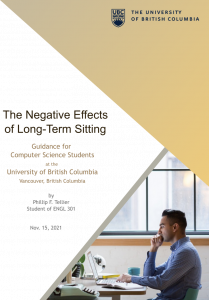The biggest assignment in unit three of ENGL 301 as well as the whole course was a formal report on a topic of our choosing. The only constraint was that the report needed to be written to aid a professional or academic organization. My report was written for the Computer Science Student Society (CSSS) at UBC to be distributed to interested computer science students. The topic was on the negative health effects of sitting for too long. After completing the first drafts of our reports, ENGL 301 students were tasked with peer reviewing each other’s reports within writing teams that were previously formed. I peer reviewed Sidney Singh’s report about maintaining active membership in the Creative Writing Student Association (CWSA) at UBC. This peer review was in the form of a memorandum.
While I have some experience writing analytical reports, I found my report challenging to write. The research on how sitting affects back pain and obesity is filled with conflicting studies. I learned to read systematic reviews in order to get a more complete picture of all the research that was done on a particular question. The whole report writing process taught me strategies to organize literature searches so that they give accurate results. I also learned to plan my writing and research time so that I could finish a large report before a deadline. This report was my first opportunity to create and collect data from a survey. The Qualtrics Survey Tool UBC provided made the process go smoothly. It even helped me create figures for the report.

Giving feedback to my writing team member about their formal report was quite time consuming. I learned that a memorandum is not the best method to advise someone on lots of editing. Since Microsoft’s Word is used to write the report, it makes more sense to use the “track changes” feature. This allows users to suggest edits and add comments to any section within the file. For instance, it would be much quicker to correct spelling mistakes since you would not need to write out the incorrect word, the corrected word, and the location in the report. Despite this, I improved my ability to effectively organize a memo with a lot of disjoint information. There is a lot to say about the first draft of a 10-page report.
Formal Report (.pdf) – Negative Effects of Long-Term Sitting – Phillip Tellier